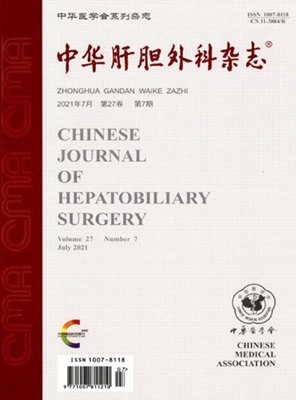Prognostic factors in patients with occult ruptured hepatocellular carcinoma after hepatectomy
Q4 Medicine
引用次数: 0
Abstract
Objective To study the prognostic factors in patients with occult ruptured hepatocellular carcinoma (HCC) after hepatectomy. Methods The clinical data of 31 patients with occult ruptured HCC who underwent hepatectomy at the Heze Multiple Hospital from January 2001 to December 2014 were retrospectively analyzed. There were 27 males and 4 females, with ages ranging from 29 to 73 years. Kaplan-Meier survival analysis was carried out for survival analysis, and compared by the log-rank test. Multivariate analysis was conducted using the Cox proportional hazards regression model. Results Of 31 patients in this study, 27(87.1%) had died, and 25(80.6%) had developed tumor recurrence and metastasis. The median overall survival was 8 months and the median tumor-free survival was 4 months. On Cox regression analysis, non-R0 resection was an independent risk factor of overall survival (RR=2.816, 95%CI: 1.006-7.887) and disease-free survival (RR=3.295, 95%CI: 1.215-8.940). Poor tumor differentiation was an independent risk factor of overall survival (RR=3.120, 95%CI: 1.193-8.160). Conclusions The prognosis of patients with occult rupture HCC who underwent no R0 resection was poor. However, the prognosis of patients who underwent non-R0 resection was even poorer. Key words: Carcinoma, hepatocellular; Hepatectomy; Rupture; Prognosis; Influencing factor肝切除术后隐匿性破裂肝癌患者的预后因素分析
目的探讨肝切除术后隐匿性破裂肝细胞癌(HCC)患者的预后因素。方法回顾性分析2001年1月至2014年12月在菏泽市综合医院接受肝切除术的31例隐匿性破裂HCC患者的临床资料。男27例,女4例,年龄29~73岁。采用Kaplan-Meier生存分析进行生存分析,并通过对数秩检验进行比较。使用Cox比例风险回归模型进行多变量分析。结果31例患者中,27例(87.1%)死亡,25例(80.6%)发生肿瘤复发和转移。中位总生存期为8个月,中位无瘤生存期为4个月。Cox回归分析显示,非R0切除是影响总生存率(RR=2.816,95%CI:1.006-7.887)和无病生存率(RR=3.295,95%CI:1.125-8.940)的独立危险因素。肿瘤分化不良是影响总存活率(RR=3.120,95%CI:1.193-8.160)的独立危险因素。然而,接受非R0切除术的患者的预后更差。关键词:肝癌;肝切除术;破裂;预后;影响因素
本文章由计算机程序翻译,如有差异,请以英文原文为准。
求助全文
约1分钟内获得全文
求助全文
来源期刊

中华肝胆外科杂志
Medicine-Gastroenterology
CiteScore
0.20
自引率
0.00%
发文量
7101
期刊介绍:
Chinese Journal of Hepatobiliary Surgery is an academic journal organized by the Chinese Medical Association and supervised by the China Association for Science and Technology, founded in 1995. The journal has the following columns: review, hot spotlight, academic thinking, thesis, experimental research, short thesis, case report, synthesis, etc. The journal has been recognized by Beida Journal (Chinese Journal of Humanities and Social Sciences).
Chinese Journal of Hepatobiliary Surgery has been included in famous databases such as Peking University Journal (Chinese Journal of Humanities and Social Sciences), CSCD Source Journals of China Science Citation Database (with Extended Version) and so on, and it is one of the national key academic journals under the supervision of China Association for Science and Technology.
 求助内容:
求助内容: 应助结果提醒方式:
应助结果提醒方式:


